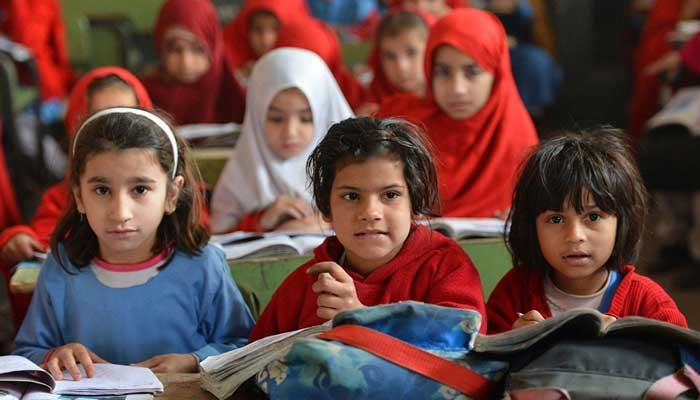[ad_1]
ISLAMABAD: The Ministry of Planning, Ministry of Federal Education, and all provincial governments have agreed to prepare a national action plan to address the issue of out-of-school children (OOSC) in Pakistan and maximize the enrolment of school-age children across the country.
The decision was made at a high-level consultative meeting on Pakistan’s OOSC crisis with Planning Minister Ahsan Iqbal in a chair, according to a statement from the planning ministry issued on Wednesday.
The meeting was attended by the additional secretary of the Ministry of Federal Education & Professional Training, provincial secretaries of education departments, the director general of the Federal Board of Intermediate and Secondary Education and a member of the Social Sector and Development of Planning Commission among other stakeholders.
In this regard, Planning Minister Iqbal directed the Federal Directorate of Education (FDE) to establish a birth certificate-based admission system in collaboration with National Database and Registration Authority (Nadra).
Under the system, as soon as a child reaches school-going age, they should be enrolled in a nearby school by the state.
Moreover, the statement said a model Universal Enrolment Pilot Project in Islamabad Capital Territories (ICT) will attempt to ensure that there are no OOSCs in the federal capital.
“After piloting this in Islamabad, the learnings may be replicated to produce similar results in other areas across the country. The Planning Ministry will also identify Pakistan’s districts with the highest concentrations of OOSC,” it added.
Furthermore, a national out-of-school children fund will be created to provide performance-based cash grants to provincial governments for improving education outcomes in the most affected districts.
Additionally, to reduce dropout rates, especially for girls who face mobility issues, the government will launch a comprehensive virtual schooling system, the communique said.
Earlier, the provincial representatives were briefed about the situation overview of OOSC in their respective provinces and shared their approaches to ensure maximum enrolment in the provinces.
The planning minister also highlighted the importance of adult literacy and directed to set up programmes to facilitate adult literacy.
Over the years, Pakistan has made considerable progress in providing access to education to its school-age population.
However, the pace of improvement has been slow compared to other developing countries. With an estimated 22.8 million children aged 5-16 years out of school, Pakistan has one of the highest numbers of OOSCs in the world.
[ad_2]

